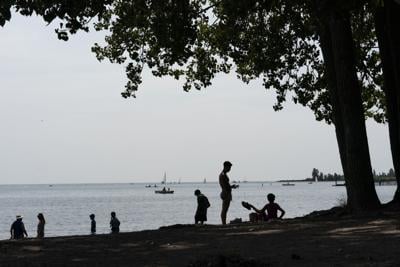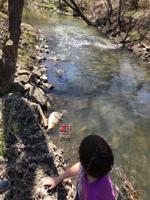There’s nothing quite like being outside.��
Whether it’s feeling the cool breeze on a neighbourhood walk, taking in a pastel-coloured sunset from a city park or exploring the great outdoors on a secluded, forested trail, there are few pleasures more simple and fulfilling than connecting with nature.����
Sunnybrook Park became a refuge for editor-in-chief Nicole MacIntyre’s family, rekindling their appreciation for the outdoors.
Sunnybrook Park became a refuge for editor-in-chief Nicole MacIntyre’s family, rekindling their appreciation for the outdoors.
It’s not hard to get outdoors, either. The ��ѻ��ý area is home to a number of under-the-radar trails, as well as��aquatic clubs, fitness initiatives��and charity runs — all��meant to encourage activity and help build lasting relationships with nature.��
And it’s good for you. Research from the , and ��shows that spending time outdoors can bring significant physical and mental health benefits. A that children who spend more time outdoors “display enhanced psycho-social health.”
From forested ravines to reclaimed landfills, these trails offer scenery, history and beginner-friendly paths just beyond ��ѻ��ý’s city limits.
From forested ravines to reclaimed landfills, these trails offer scenery, history and beginner-friendly paths just beyond ��ѻ��ý’s city limits.
But how��much outdoor time is enough?
The Exeter study suggests that as little as two hours per week can yield health benefits, though defining the “right” amount is��complex, says John Zelenski, a professor of psychology at Carleton University and the director of the Carleton University Happiness Laboratory.��
“It’s hard to set up the perfect study where you can really nail this down and then even if you did that, you could imagine hundreds of variations on those minute details,” Zelenski told the Star, alluding to differing definitions of what is considered time sufficiently spent outdoors.��
Still, the benefits are clear. Spending time in nature can increase happiness, add a sense of meaning to life and reduce the symptoms of anxiety and depression. There’s even evidence to suggest that the number of bird species in your neighbourhood can improve positive mental health outcomes.��
Now decades later, Jo-Anne Robertson reflects on how Camp Huronda gave her tools to live with type 1 diabetes and a community that still supports her.
Now decades later, Jo-Anne Robertson reflects on how Camp Huronda gave her tools to live with type 1 diabetes and a community that still supports her.
Spending time outdoors can restore attention and focus, and Zelenski adds that research suggests that even “virtual nature” — watching a nature video or immersing oneself in a virtual reality environment — can cause a short-term mood boost.
“We have data to suggest that it’ll be even better than you think,” Zelenski said. “On average, it’s better than people guess it will be.”��
Catherine Sabiston, a professor of kinesiology at the University of ��ѻ��ý and director of the Mental Health and Physical Activity Research Centre, agrees. She notes that rigid guidelines can be tough to back with solid evidence and even harder to apply broadly, given how much people’s routines and rhythms vary.
These excursions with my grandpa over many summers ignited a flame.
These excursions with my grandpa over many summers ignited a flame.
The recommendation that we need 10,000 steps per day, for example, isn’t backed by a wealth of scholarly research, she said, but that doesn’t mean that the general principle shouldn’t still hold: getting moving, especially outside, is undoubtedly beneficial.��
“There’s a heightened brain-chemical response that helps with your mood and your mental health,” Sabiston said. “We know that the endorphins in our bodies and our natural systems are functioning at their best when we’re moving, and that is then compounded, in a good way, by being in the outdoors.”��
The time spent outdoors doesn’t have to be intense physical exercise or organized sports, notes Leigh Vanderloo, the scientific director at ParticipACTION, a Canadian non-profit organization dedicated to promoting fitness and exercise.
But there are unique benefits to spending time in more sequestered, tree-heavy areas, including exposure to phytoncides, airborne organic compounds found in plants that can improve immune response.
“There are certainly some additional benefits, especially from an immunity-boosting perspective or mental health, where there’s added bonus if we can be in more of a forested area,” Vanderloo said. “But also realizing that’s not necessarily something that’s afforded to everyone, or at least not on a regular basis.”��
Star reporter Serena Austin’s early introduction to camping broadened her perspective and gave her a lasting appreciation for the outdoors.
Star reporter Serena Austin’s early introduction to camping broadened her perspective and gave her a lasting appreciation for the outdoors.
Even if there’s no definitive, agreed-upon figure that should rigidly adhered to, Vanderloo says that getting outside at least once a day is optimal, while Sabiston offers a more utilitarian perspective.��
If being connected to nature makes for a more conducive and attractive environment in which to exercise, that’s enough of a benefit on its own.����
“The variety that being in the outdoors and the novelty that brings makes it less of an effort,” Sabiston said. “It makes it less of a hardship and more of an enjoyable experience.”��
That’s something many children first discover at summer camp — where days are filled with movement, fresh air, and freedom.
Each year, the ��ѻ��ý Star Fresh Air Fund helps make that experience possible for thousands of kids. If you’re able, consider donating to help more children enjoy the lasting benefits of time spent outdoors.
The ��ѻ��ý Star Fresh Air Fund
How to donate:
Online:
To donate by Visa, Mastercard or Amex using our secure form.
By cheque:
Mail to The ��ѻ��ý Star Fresh Air Fund, 8 Spadina Ave., ��ѻ��ý, ON M5V 0S8
By phone: Call 647-250-8282
Tax receipts will be issued.
FOLLOW US ON SOCIAL:
Instagram: @torontostarchildrenscharities
Facebook: @thetorontostarchildrenscharities
X: @TStarCharities
LinkedIn: The ��ѻ��ý Star Children’s Charities
TikTok: @torstarchildrenscharity
#StarFreshAirFund
























